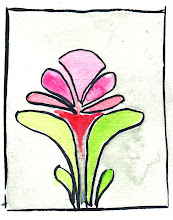Adele sent this wonderful lyric by a "a very British poet who is not all that fashionable these days." She mentioned that it comes to mind every time she sees a tree in bloom:
LOVELIEST of trees, the cherry now
Is hung with bloom along the bough,
And stands about the woodland ride
Wearing white for Eastertide.
Now, of my threescore years and ten,
Twenty will not come again,
And take from seventy springs a score,
It only leaves me fifty more.
And since to look at things in bloom
Fifty springs are little room,
About the woodlands I will go
To see the cherry hung with snow.
A. E. Houseman from "A Shropshire Lad." (Hey, didn't Vaughn-Williams set this to music? Why, yes he did...and what do I see but a recording by (sigh) Bryn Terfel. Stop it, B, you're going off on a tangent...)
I appreciate the need to take time out for what is important - and getting out to note the things in bloom is a very high priority for me. It takes some doing in the city, but I manage. It's part of replenishing what's alive, what's human in me.
In thinking on this (to me) idyllic poem, I got to remembering a lyric to a song by Silvio Rodriguez , vanguard of the nueva trova movement, and, to me anyway, a powerful voice in Cuba:
Días y Flores
Si me levanto temprano,
fresco y curado,
claro y feliz,
y te digo: voy al bosque
para aliviarme de tí,
sabe que dentro tengo un tesoro
que me llega a la raíz.
Si luego vuelvo cargado
con muchas flores
(mucho color)
y te las pongo en la risa,
en la ternura, en la voz,
es que he mojado en flor mi camisa para
teñir su sudor.
Pero si un día me demoro, no te impacientes,
yo volveré más tarde.
Será que a la más profunda alegría
me habrá seguido la rabia ese día:
la rabia simple del hombre silvestre,
la rabia bomba —la rabia de muerte—,
la rabia imperio asesino de niños,
la rabia se me ha podrido el cariño,
la rabia madre por dios tengo frío,
la rabia es mío —eso es mío, sólo mío—,
la rabia bebo pero no me mojo,
la rabia miedo a perder el manojo,
la rabia hijo zapato de tierra,
la rabia dame o te hago la guerra,
la rabia todo tiene su momento,
la rabia el grito se lo lleva el viento,
la rabia el oro sobre la conciencia,
la rabia —coño— paciencia paciencia.
La rabia es mi vocación.
Si hay días que vuelvo cansado,
sucio de tiempo,
sin para amor,
es que regreso del mundo,
no del bosque, no del sol.
En esos días,
compañera,
ponte alma nueva
para mi más bella flor
(Don't worry, I'm working on a translation of this - will have it up very soon. The gist of it is that he's telling his love that when he goes to the woods to get away from the world, to get away from her, to be among the flowers (and to return with some for her) it is because of his need to rage, rage against injustice, rage against rage, rage to cleanse his soul, as rage is his vocation. He may come back filthy from the world, time, whatever, but he asks her to be patient, for he wishes to come back with the most beautiful flower of all: a cleansed and rejeuvenated soul.)
Two strong voices for "national" movements (English Pastoralism I'm thinking with Houseman, Nueva Trova for Rodriguez) going back to nature to rejeuvenate themselves. To remind themselves that they live by surrounding themselves with the spring blooms - how interesting to find similar words spoken with different accents on such a universal theme.
Subscribe to:
Post Comments (Atom)

1 comment:
Love this song. I'm sorry to say, though, that while I certainly understand the gist, I don't totally understand the last line (I've only been studying Spanish less than 4 months now). If the poet is talking about his own soul, why does he use the imperative (ponte)? Doesn't that suggest he's talking about his lover's soul? Or is there a meaning of ponerse that I haven't learned yet (at this point I'm thinking "put on" or "change into")? Also, if the point of the poem's end is that his soul has been rejuvenated by nature, why does he say "es que regreso del mundo, no del bosque, no del sol."
THANKS FOR ANY INSIGHT / HELP!
Post a Comment